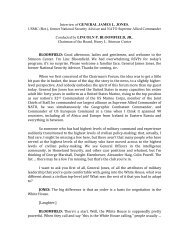Islam and Politics - The Stimson Center
Islam and Politics - The Stimson Center
Islam and Politics - The Stimson Center
Create successful ePaper yourself
Turn your PDF publications into a flip-book with our unique Google optimized e-Paper software.
88 | Faith, Justice, <strong>and</strong> Violence: <strong>Islam</strong> in Political Context<br />
Muslim duty. However, a tendentiously<br />
simplistic reading of jihad specifically<br />
or violence more generally may undercut<br />
the credibility of the defense. It may<br />
also impede clear underst<strong>and</strong>ing <strong>and</strong><br />
honest appraisal of the difficulties presented<br />
<strong>and</strong> the ideological <strong>and</strong> political<br />
work to be done.<br />
“Slay the polytheists wherever you find them.<br />
But if they repent, <strong>and</strong> perform the prayer, <strong>and</strong><br />
pay the alms, then let them go their way; Allah is<br />
all forgiving, all compassionate.” -—Quran 9:5<br />
“<strong>The</strong>y long that you should disbelieve so that<br />
you might be on the same level; so take not<br />
from among them friends until they flee their<br />
homes in Allah’s way. <strong>The</strong>n if they turn back to<br />
hostility, seize them <strong>and</strong> kill them wherever you<br />
find them, <strong>and</strong> take no friend or helper from<br />
among them.” —Quran 4:89<br />
<strong>The</strong> distinction between the “greater”<br />
jihad of spiritual <strong>and</strong> ethical striving<br />
<strong>and</strong> the “lesser” of armed struggle is<br />
important to <strong>Islam</strong>’s defenders. However,<br />
this is of limited authority within <strong>Islam</strong>ic tradition, at least among strict schools,<br />
in that it is a “popular tradition,” not strictly speaking hadith. Moreover, although jihad<br />
means “struggle, endeavor, striving, or fight,” <strong>and</strong> not “war” as such, most commentary<br />
treats armed struggle as at least one of its important dimensions. <strong>The</strong> fact that most writers<br />
note that jihad in the path of Allah is the only form of warfare permitted suggests that<br />
divinely sanctioned violence is indeed legitimate.<br />
Many Muslims today feel beleaguered in their own societies by the forces of global capitalism,<br />
by Western culture, <strong>and</strong> by local autocracies supported by Western powers. Even those<br />
in democratic Muslim societies find in secularism or in economic inequality an existential<br />
threat to all that is familiar <strong>and</strong> all that is validated as righteous by religious education<br />
<strong>and</strong> socialization. Such a sense of existential threat to the ummah <strong>and</strong> to an authentically<br />
<strong>Islam</strong>ic way of life is a ready c<strong>and</strong>idate for jihad in the more worldly sense, including that<br />
of violence. All this is so regardless of radical ideologies, fundamentalist propag<strong>and</strong>a, or<br />
puritan revivalism, though their introduction certainly sharpens the sense of antagonism<br />
<strong>and</strong> feeds on the broader sense of social <strong>and</strong> cultural grievance.<br />
Even where very few are ready to actually engage in jihad themselves, the willingness of<br />
many to accept the legitimacy of the actions of the few will be greater under such circumstances.<br />
Because there is also a substantial <strong>and</strong> respectable intellectual tradition that speaks<br />
to the duty of Muslims to come to the rescue of Muslims oppressed in other societies, the<br />
conduct of what we might call “solidarity jihad” will also be more acceptable.<br />
Two intellectual approaches are deployed in an attempt to domesticate the destabilizing<br />
<strong>and</strong> subversive potential of this. One, found among progressive <strong>and</strong> liberal Indian <strong>Islam</strong>ic<br />
scholars such as Asghar Ali Engineer, questions the authority of canonical doctrine on the<br />
grounds that it merely reflects accidental reasons of state, not divine guidance. <strong>The</strong> other,

















